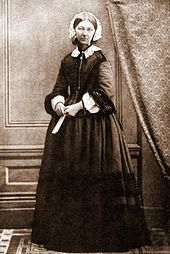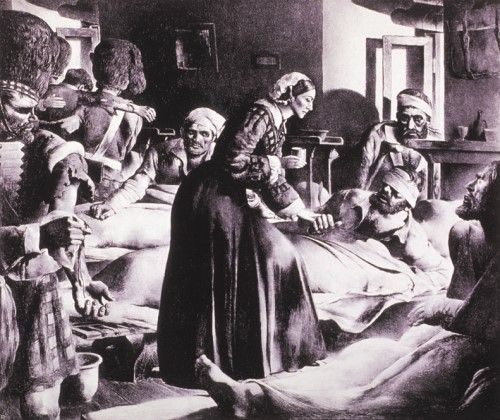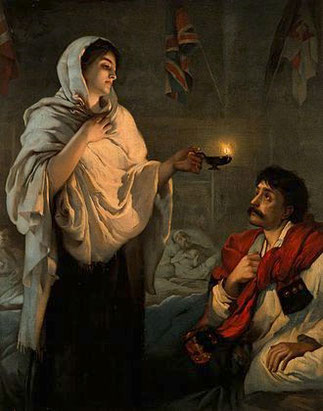 |
| Florence Nightingale circa 1858 ( (Goodman )) |
Florence Nightingale once said, "I attribute my success to this:-I never gave or took an excuse". Throughout her life, Florence Nightingale was an inspiration, and it all started with her upbringing. She was born on May 12, 1820 in Florence, Italy. She and her family lived a very comfortable and high-status life. When she was 16, she got what she described as a "call from god" to help lessen human suffering and to help people. She thought nursing was a good decision and went to school to study medicine. After her schooling, she served in the Crimean War in 1854. During that war, she increased the rate of survival and improved sanitary conditions. Nightingale was the first person to realize you need to be sanitary when dealing with germs and blood. After the war, she returned home to London, England where she died on August 13, 1910 at the age of 90. To be a hero, someone must do something to help the public and not expect anything for themselves. They must be selfless and not expect rewards for their actions. Florence Nightingale is an inspiration and hero because of her many contributions to the public knowledge of medicine and she risked her life to serve wounded soldiers.
Florence Nightingale is considered a hero because she helped mankind by making contributions the the public's knowledge of medicine. The encyclopedia of world biography states: "The English nurse Florence Nightingale was the founder of modern nursing and made outstanding contributions to knowledge of public health" (Encyclopedia of World Biography). Florence Nightingale made lots of advances in modern medicine. She helped save more lives than in any war before the Crimean war and made the survival of amputations and wounds rise. After the war, she went back to London to settle down. While there, "She was the first woman awarded the Order of Merit " (Encyclopedia Britannica). She was awarded The Order of Merit in 1907. This is an award presented to those who have done a great deed in helping the armed force and military. There are only 24 people who have been awarded this and only 3 of them were women. There are many reasons why she was awarded the Order of Merit. One reason is that: "During the Crimean War, she and a team of nurses improved the unsanitary conditions at a British base hospital, greatly reducing the death count." (biography.com ). She improved the conditions of hospitals during the war and lessened the death count from injuries by hundreds if not thousands. She was the the first person to implement the fact that war hospitals and camps need to be sanitary and safe. She left such a lasting impression on everyone that she got her own day of remembrance. "International Nurses Day, observed annually on May 12, commemorates her birth and celebrates the important role of nurses in health care" (Encyclopedia Britannica). She had a very important role in the medical field and still continues to have a lasting imprint. Florence Nightingale is considered a hero because she left a lasting impression on everyone by making many contributions to the knowledge of medicine.
 |
| Florence Nightingale helping in a war camp ( (National Library of Medicine )) |
Florence Nightingale is considered a hero because she gave her life to serve in a war as a nurse and to help other people. Florence Nightingale served in the Crimean war but, before she volunteered to go join the fight, she had a wealthy and easy life. "[T]he Nightingales had a comfortable lifestyle, dividing their time between two homes, Lea Hurst in Derbyshire, located in central England, and Embley Park in warmer Hampshire, located in south-central England"(Selanders) . She and her family had two houses/mansions that probably had many servants and staff. She gave up her life of high stature to help people and reduce human suffering. When she was about 16 years old, she heard God tell her to help people. "She viewed her particular calling as reducing human suffering. Nursing seemed the suitable route to serve both God and humankind" (Selanders). She thought that her purpose in life was to help people and decrease human suffering. Once she knew she wanted to become a nurse, she went with it. "In October 1854 Nightingale organized a party of 38 nurses, mostly from various religious orders, for service in the Crimean War..[and]the flow of sick and wounded soldiers from the Crimea rapidly increased" (Encyclopedia of World Biography). She arrived in October of 1854 and immediately started helping the wounded. She got 38 nurses and went to a British base in Scutari and started helping. Immediately, the flow of soldiers that were wounded or sick increased. After the war, she returned home to London, England. "Florence Nightingale never really recovered from the physical strain of the Crimea. After 1861 she was housebound and bedridden. She died on Aug. 13, 1910" (Encyclopedia of World Biography). She never recovered from all of the hard work she did during the war. She got sick with a disease that was going around inside the war hospital and was bedridden. She lost her life because of the things she did in the war. Florence Nightingale is considered a hero because she gave up her entire life and lifestyle to help people and reduce human suffering.
 |
| The Lady with the Lamp ( (Henrietta Rae, 1891)) |
Florence Nightingale is an inspiration and hero because of her many contributions to the public knowledge of medicine and she risked her life to serve wounded soldiers. She was born on May 12, 1820 then served in the Crimean War and never recovered from the physical strain of lifting patients, wrapping wounds, and just all around hard work. She was awarded the Order of Merit in 1907 and was the first woman to do so. Florence Nightingale died on August 13, 1910. Throughout her life, she made many contributions to the public's knowledge of medicine and gave up her high- status life to serve wounded and sick soldiers. During the Crimean War, she and a team of nurses improved the unsanitary conditions at a British base hospital, greatly reducing the death count (Encyclopedia World Biography). She made many medical advancements for the public good, many of which we still use today. She still and will always have a lasting imprint in the medical technology we use today.
Works Consulted Biography.com Editors. "Florence Nightingale." Biography.com, A&E Networks Television, 15 Feb. 2017, www.biography.com/people/florence-nightingale-9423539. Accessed 28 Apr. 2017. "Florence Nightingale." World of Health, Gale, 2006. Biography in Context, link.galegroup.com/apps/doc/K2191100274/BIC1?u=powa9245&xid=15b0583a. Accessed 28 Apr. 2017. "Florence Nightingale." Encyclopedia of World Biography, Gale, 1998. Student Resources in Context, link.galegroup.com/apps/doc/K1631004855/SUIC?u=powa9245&xid=cf606bdc. Accessed 28 Apr. 2017. Gorrell, Gena K. Heart and Soul: The Story of Florence Nightingale. Plattsburgh, NY, Tundra Books of Northern New York, 2005. Selanders, Louise. "Florence Nightingale." Encyclopædia Britannica, Encyclopædia Britannica, Inc., 15 Feb. 2017, www.britannica.com/biography/Florence-Nightingale. Accessed 28 Apr. 2017.
Page created on 5/17/2017 12:00:00 AM
Last edited 5/17/2017 12:00:00 AM
